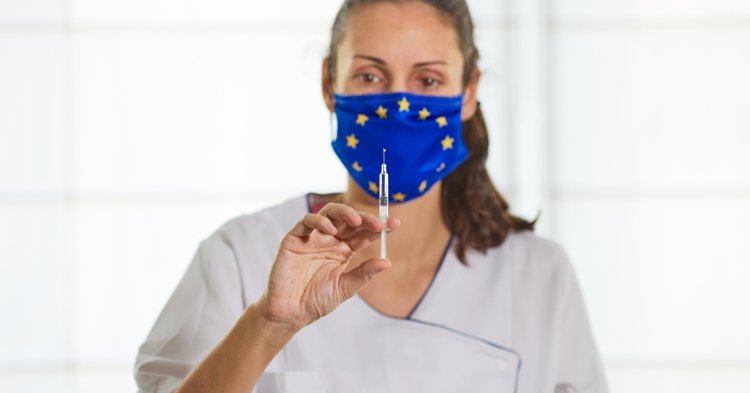
Davide Emanuele Iannace for Eurobull: Italy and vaccination - how is it going?
The vaccine campaign was launched in Italy on 27th December 2020. According to official data – published online on a daily basis by the government – 1.2 million people had received the vaccine by mid-January. According to Pfizer, a few delays are to be expected while the factory in Antwerp undergoes renovation in order to handle the necessary production increase.
Despite a result that we can consider as good, the campaign is still being the object of several grievances. Opposition parties are protesting the lack of efficiency shown by Arcuri - the special commissary appointed to deal with the crisis since March 2020. Some region’s presidents protested as well, considering the distribution of the vaccines to be unequal and disproportionate between them, criticising the criteria for distribution applied by the central government in Rome.
At the same time, despite the information campaign promoted by the Ministry of Health, the number of people who do not want to receive the vaccine against Covid-19 is still high.
Even with the programme ongoing, speeding up to keep the pace and to ensure the necessary spread of the vaccine everywhere, the real doubt is not on the vaccine itself, but on whether the containment measures will be able to slow the spread of the virus. Italians are becoming more and more unsettled, after another round of lockdowns was announced in some of the country regions. The feeling that the government is not doing enough to compensate for the damage that resulted from Covid-19, and the ongoing political crisis that exploded after Matteo Renzi and his party’s decision to leave the government coalition, have created a sense of insecurity. As usual, such a feeling is allowing the more nationalist and populist parties to gain ground in the polls again. At the same time, it is moving people toward rejecting the measures of containment issued by the government.
Between delays and the lack of trust of the population, there is a risk that the virus will spread more rapidly than the vaccine, making all the sacrifices made by the country during the last year in vain. The only chance is on one hand, to maintain the pace of the vaccine campaign and to continue with the information campaign, and on the other, it is necessary for the government to be able to regain the trust of the population in order to avoid the civilian insubordination which, rapidly, could cause a third wave of Covid-19.

Sven Alexander Gal for România Europeană: A good start to the vaccination campaign
The vaccination campaign was launched in Romania on 27th December 2020. The first person to receive the vaccine was Mihaela Anghel, a nurse who is working at the Matei Balș Institute of Bucharest and was part of the team, which supervised the first Covid-19 confirmed case in Romania. By 1st February, 47,50,86 people had been vaccinated with at least one dose, and 12,30,49 had received both doses.
The campaign started in a very enthusiastic manner. The first category to be vaccinated included the healthcare workers, and this stage ended successfully. The second category include older people (65+), people with chronic diseases and essential workers. Bigger problems began with the second stage however. The online platform for registration had problems, because of the big number of accessions. Additionally the delays of Pfizer’s deliveries caused big concerns. People registered to be vaccinated on a certain date for the first dose, were then rescheduled 10 days later.
The political situation plays an important role here. The campaign started just after a new government came in power formed by a pro-european coalition (PNL-USR-PLUS-UDMR). The opposition Eurosceptic AUR party considers the vaccine as being inefficient. AUR is also known here for their anti-mask politics.
The Minister of Health started a campaign to inform people about the vaccine. Different doctors and nurses, known publicly as fighters against the pandemic, spoke on TV to inform people, but the number of people who don’t want to get vaccinated still remains high.

Isabelle Walker for The New Federalist: UK vaccine roll-out - is there hope for 2021?
When news broke that the UK was the first country to approve the use of the Pfizer/BioNTech Covid-19 vaccine on 2 December 2020, there was an undoubtable wave of relief among the British population. For the first time since the spread of Covid-19 into the UK back in March, there was a feeling of hope that the end of the pandemic may be in sight.
A plan of who would be the first to receive the vaccine was quickly drawn up, with front-line health care workers and care-home staff and residents being the first in line. An initial order of 800,000 Pfizer/BioNtech vaccines was placed, and what would be the largest vaccination programme in British history began.
Fast forward to January 2021, and the vaccination programme is very much in full swing. Additional vaccines that have been approved include the Oxford/AstraZeneca vaccine and Moderna vaccine, although the Moderna vaccine won’t be available in the UK until Spring. The approval of the additional vaccines is a huge step in the right direction, as they cause less logistical challenges than the original vaccine that has to be stored at minus 70 degrees.
The programme seemed to hit a bump in the road this week, when the EU evoked the ‘get out clause’ in Article 16 of the Northern Ireland Protocol which could have seen a bloc on vaccine exports to the UK. The tensions began after Oxford vaccine maker AstraZeneca announced it may not be able to supply as many vaccines as planned to the EU by Spring. However this quickly subsided, with the EU reversing its decision.
As we start hearing stories of elderly relatives getting vaccinated and finally being able to leave the house for the first time since March, the mood seems to be lifting despite currently being in the third lockdown of the pandemic. By 27 January 2021, more than six million people had received a vaccination, with nearly 450,000 people being given two doses of a vaccine. The UK aims to vaccinate 15 million people by February, amounting to 380,000 vaccines a day which is very welcomed news.
Despite the current success of the vaccination programme, the pandemic is still very much a reality, and with the death rate hitting 100,000 this month it is clear the government has a lot to answer to.

Florian Bauer for treffpunkteuropa.de: Hopes rising as infections drop in Germany
Germany is experiencing a prolonged and strict lockdown including curfews in some regions - and it finally seems to be paying off. Infection rates are declining and, although Chancellor Merkel is cautious of optimism due to the threat of the new virus variant B117, many Germans hope for a lifting of the toughest restrictions. The German vaccination campaign experienced some rollout problems in the beginning and there certainly was and still remains some envy towards the vaccination frontrunners Israel, the USA and the United Kingdom who started their efforts earlier and arguably more successfully.
While some of the delays in Germany were linked to the difficulties of vaccinating the prioritised group of elderly people in care homes, the main obstacle now is the slow, unsatisfactory supply of vaccines. The procurement strategy of the EU is heavily criticised as being too hesitant and especially politicians on the right suggest that Germany would have been better off alone. Nevertheless a majority of 70% generally supports the European approach (7th January), although this number probably dropped after the latest supply problems.
The general sentiment is that the EU should have followed more of a “whatever it takes” approach and especially German economists call for more investments in vaccination production capacities. Recently, the German minister for economic cooperation and development joined these calls, highlighting the need to increase production to also support developing countries in their vaccination efforts.
Good news is a reduction in vaccination scepticism which was a big concern at the start of the campaign and in the last polls 75% indicated they would likely or definitely get vaccinated. At the same time, fierce debates about who should carry most of the lockdown burden are ongoing. The lack of strict measures for companies, where working from home was only a recommendation, infuriated many, because especially children were forced to stay at home. Lately, the measures for companies have become stricter, although stopping short of a clear enforcement of working from home.
While it becomes increasingly unlikely that vaccination targets will be reached, Germans are hoping for the summer to come quickly, and still remain broadly supportive of the government’s strategy.

Alicja Rajpert for Kurier Europejski: How is Poland (not) dealing with the National Vaccination Programme?
“Today more than 60,000 people have been vaccinated, which means that we have exceeded one million vaccinated in the country, where 150,000, are people who received the second dose, while 850 thousand - are people who received the first dose of the vaccine,” Health Minister Adam Niedzielski said on Wednesday 27th of January.
In order to plan actions to ensure safe and effective vaccination among citizens, the Polish government created the “National Vaccination Programme”. According to the Health Minister, Poland has 85 million doses contracted, which means that complete doses for over 50 million people are guaranteed, and the vaccinations are intended for adults, of whom there are 31 million. In theory, at the contractual level, security in terms of the number of vaccines for the entire population is safeguarded. The Covid-19 vaccination programme is divided into four stages. Stage zero started on 27th December and includes health care workers and nursing home residents. On 25th January, vaccinations began for people eligible for stage one, including seniors over 60, chronically ill people and home hospice patients.
This is in theory - how is the programme working in practice? The first month of the vaccination is hard to count as a spectacular success. What are the main problems? Conflicting information on eligibility for group zero, cases of vaccinations out of sequence or information on disposed vaccine doses. Frequent changes in the criteria for inclusion in the planned group one, as well as problems with online or telephone registration for the programme have resulted in the slow pace of vaccinations. On the plus side, we can definitely mention an increasing percentage of adult Poles - especially seniors - who are willing to be vaccinated against Covid-19. According to the survey conducted in early January, a total of 44% questioned said they would like to be vaccinated, which is an increase from the mid-December survey.
In parallel to the vaccination programme, the government still keeps strict measures which cause more and more harm to Polish economy. At the same time, not enough support is transferred to the companies affected. It is therefore not surprising that frustration among citizens grows and some of the entrepreneurs decided to open their businesses against the imposed restrictions - risking high administration fines. This phenomena, combined with the slow pace of the vaccinations, might inevitably lead to a third wave in cases, and consequently to a higher number of deaths.
Sadly, the government representatives disregard their own rules, which is why more and more people do not follow safety guidelines. What we need now is the authorities giving a good example as well as educational campaigns which might help in building up social responsibility and consciousness. Let’s also hope for a more efficient production and delivery of vaccines by pharmaceutical companies as it seems to be the only solution to this unprecedented crisis.

Sophia Berrada for Le Taurillon: Slow progress and a wary public
Pandemic or not, in France, vaccination has always been a difficult topic. “Pasteur’s country” is also the country where the suspicion about vaccines is the highest in Europe, and worldwide. While laboratories were promising efficient vaccines over and over, a study of the Jean Jaurès Fondation, published on the 17th of November, showed that the French population was not eager to welcome the Covid-19 vaccines. In November, 54% of the French population declared being open to get the Covid-19 vaccine jab, however, 24% of them was stating that they “would probably not take it”, and 19% declared with certainty that they did not want to take it. At the same time, Hold-Up, a “documentary” full of conspiracy theories and fondamentally against the vaccine, was making a lot of noise on social media and particularly on “les gilets jaunes” and Dider Raoult support Facebook groups.
The opinion of those who are commonly called “antivax” seems to be taken into account by the actions of the French government : one week after the publication of this study, Emmanuel Macron announced that vaccination wouldn’t be mandatory, the creation of a new scientific committee and a drawn citizen group which would work together on the vaccination policy. At the beginning of December, the government announced that it had decided to follow the recommandations of the Haute Autorité de Santé : elderly people living in EHPAD (retirement homes) and the staff working there would be vaccinated in January, more-at-risk people because of their age or pathology in February, and finally the rest of the population in Spring.
The slow vaccination process (526 persons in eight days) combined with the lack of masks and the delay of the testing strategy at the beginning of the pandemic made a lot of noise. This slowness was due to the logistical constraints of the vaccines conservation, to their dispatch to the EHPAD (retirement homes) (at the beginning, France refused to create vaccinodromes), and to the necessity to collect consent from the elderly after a pre-vaccinal consultation.
A steady pace was reached in January: now almost 1.5 million of French people have received at least one dose of the vaccine. Delays of delivery announced by AstraZeneca have made people grind their teeth, however, efficiency of authorised vaccine on the “British’’ and the “South-African” variant allow for a relief. The public debate on vaccination continues and is raising several questions: should the young people, whose mental health is dangerously precarious, be prioritised in the vaccination campaign? Was it a necessity for Brussels to negotiate the prices of the vaccines that much if laboratories prioritise the countries which paid the highest prices? Should the threat of current or future variants dampen our hopes of a crisis recovery this year?







Follow the comments: |
|
